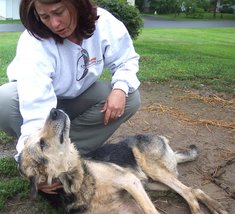 If you consider yourself and animal person, you are probably more aware of how other people treat their animals that some people. You notice the dog chained to a tree. You see the skinny cat which belongs to your neighbor. You lament the dog you see living in a pen 24/7/365 with no human interaction. Some people can see these things and simply tell themselves that it is none of their business and not their responsibility to remedy or fix. Others of us lose sleep over these animals. We tell ourselves that there must surely be something we can do to make their lives better. Surely there are law enforcement authorities who can help. Yes. And no. Most of us will see something or become aware of a situation in our lifetime which we consider animal abuse, neglect or cruelty. The reality is that whether or not what we see is illegal is a different question entirely. Each state has state laws regarding animals, some of which are strong and some of which are not. Many municipalities have their own laws regarding treatment of animals and yet other municipalities rely on the state laws for standards. The only federal law related to animals is the Animal Welfare Act which was enacted in 1966 and which regulates the treatment of animals in research, exhibition, transport, and by dealers. The point is that what is illegal in one place may be perfectly legal in another place and there is little you can do about it. What you see may bother you and keep you up at night, but it is entirely possible that law enforcement authorities cannot do anything about it at all. We have legal principles in our country which are understood by most people as a result of public education, through some personal knowledge of the legal system, from awareness of current events or just from reading books or seeing movies and television shows. We are all familiar with the concept that people are innocent until proven guilty using our legal system. Most of us are also familiar with general principles of due process and probable cause. In order to pursue a criminal case against a person for a wrong, they must be breaking an existing law and there must be a way to prove that using evidence, normally in the form of first-hand testimony and exhibits. The burden of proof is on the prosecution to prove that someone committed some wrong. We learn of situations all the time when some crime was committed, but it cannot be prosecuted because those with direct knowledge refuse to testify about it. The same is true regarding animal crimes. If you see something you don’t like, you can submit an anonymous report in many areas of the country. But almost all of those places which allow for anonymous reporting also require the complaining party to testify if an actual criminal case moves forward. Only those people with first hand knowledge of the abuse, neglect or cruelty can provide evidence - in the form of testimony - in support of a criminal case. This responsibility cannot be passed along to a third party or to animal control personnel.  Some instances of abuse, neglect and cruelty are self-proving. For example, if you live in a community where it is illegal to chain a dog to an object (like where I live), you can call and report a chained dog to local law enforcement. They can then go to the location, see the chained dog for themselves and issue a citation about it. That may lead to further legal action. In my city it is a misdemeanor offense to chain a dog or fail to care for a dog who lives outside. People are given an opportunity to comply with the law first but then are subject to criminal penalties if they do not comply or if they repeat the offense. Other situations are not self-proving and require you to become personally involved. You may see something day after day which bothers you. A cat who is being physically abused by being kicked or thrown. A dog who never has water or who has no shelter. If authorities go out to check it, it is entirely likely the animal owner will either deny the allegations or will claim the situation just arose. The water just ran out. The shelter was there an hour ago. In some cases, authorities will have to have a search warrant to investigate abuse and neglect which has been issued by a judge as a result of a showing of probable cause. In many cases there is little authorities can do about the abuse, neglect or cruelty absent your willingness to speak up for the animals who cannot speak for themselves. You are the one who must break the he said/he said stalemate by reporting what you know, by being prepared to file a formal complaint, by being prepared to testify about what you know and perhaps even by providing photographs you took or video you have recorded (while doing so in a manner which does not amount to trespassing or harassment of the animal owner). I got into an argument of sorts with some rescuers recently who are upset about how a man is treating his dogs. They have been told numerous times by authorities that they must file a formal complaint in order for criminal charges to be considered. They must have evidence of what they allege has occurred even if that evidence is only in the form of personal testimony. They simply refuse to do so. They also refuse to meet with authorities to talk about their concerns or about to keep track of what they see in order to develop evidence. Their opinion is that it is the job of the animal control officer in a particular county to handle the situation without them having to be involved. Our legal system simply does not work that way in cases that are not self-proving. They can complain about the ACO all they want, but it does nothing to help the dogs they claim are being neglected in some way. Animal control officials have been to the property multiple times, have spoken with the owner multiple times and have found no “actionable” neglect or abuse. They have even gone so far as to persuade the owner to surrender some of his dogs to rescuers and to allow rescuers to provide dog houses for his dogs in an effort to improve their quality of life. Is the situation perfect? No. But what is happening on the property that is within view of officials is not illegal and the people who claim to have knowledge of neglect refuse to step up and report what they know formally. If you see something which bothers you so much that you loose sleep over it or you feel compelled to get involved, please be prepared to own your outrage. If you think the animal owner is approachable, try direct contact first. There may be circumstances going on of which you are not aware. If the person is not approachable and you really want something done by someone, remember that the someone is you. If you have time to complain about the situation on social media, you have time to channel your energy into positive action. Stand up for what you believe and speak for the sake of the animals who cannot speak for themselves. If you won’t do it, who will? Other information on this topic is found on these pages here: Animal Cruelty in Your State Who to Contact and What to Report Reporting Mills, Dog Fighting or Hoarding Using Common Sense Regarding Animal Cruelty (images courtesy of Chris Haight Pagini and Tamira Ci Thayne)
1 Comment
|
AuthorI am an animal welfare advocate. My goal is to help people understand some basic issues related to companion animals in America. Awareness leads to education leads to action leads to change. Archives
July 2024
Categories
All
image courtesy of Terrah Johnson
|


 RSS Feed
RSS Feed